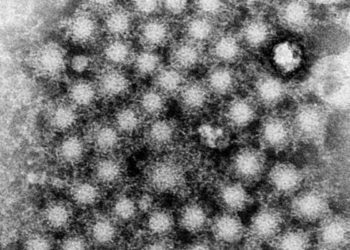Sofosbuvir, ribavirin achieve high rates of Hepatitis C virus remission in toughest cases
Image: PD
1. Participants treated for 24 weeks with sofosbuvir and either weight-based or low-dose ribavirin achieved undetectable viral loads of 68% and 48% respectively.
2. Factors associated with relapse include male sex, advanced liver disease, and high baseline Hepatitis C virus RNA before treatment.
Evidence Rating Level: 1 (Excellent)
Study Rundown: Hepatitis C virus (HCV) is a major cause of end-stage liver disease and hepatocellular carcinoma in the United States. Data is limited on the efficacy of direct-acting antiviral agents in achieving HCV remission in populations with unfavorable treatment characteristics. This study determined the efficacy of sofosbuvir combined with either weight-based or low-dose ribavirin by determining viral loads or sustained virologic response (SVR24) at 24 weeks of treatment. The participants were predominantly African American, male, obese, with unfavorable HCV genotypes, and high baseline HCV RNA levels. By 24 weeks, 68% of participants had SVR24 in the weight-based ribavirin group, and 48% of participants had SVR24 in the low-dose ribavirin group. The study found that male sex, advanced liver disease, and high baseline HCV RNA contributed to higher rates of relapse. Strengths of study include using a population that generally has poor treatment outcomes to traditional HCV therapies, which may be representative of the populations where HCV is epidemic in the U.S. Limitations include the small sample size. The study may inform future practice by providing evidence of the effectiveness of an interferon-free regimen for HCV treatment in difficult to treat patients.
Click to read the study published today in JAMA
Relevant Reading: Nucleotide Polymerase Inhibitor Sofosbuvir plus Ribavirin for Hepatitis C
In-Depth [single-center, randomized, phase 2 trial]: This study determined the efficacy of sofosbuvir with weight-based or low dose ribavirin on HCV genotype 1 remission for 60 patients in a representative population associated with poor treatment outcomes. In part 1 (proof of concept), 10 participants with early to moderate liver fibrosis were treated with sofosbuvir and weight-based ribavirin. Ninety percent (95% CI, 55-100%) achieved undetectable viral loads at 24 weeks of treatment (SVR24). In part 2, 50 participants with all stages of fibrosis were randomized into 2 groups with sofosbuvir combined with either weight-based or low-dose ribavirin. Ninety six percent of participants in both groups achieved viral suppression by week 4. When treated with sofosbuvir and weight-based ribavirin, 68% (95% CI, 46-85%) of participants achieved SVR24, compared to 48% (95% CI, 28-69%, P = 0.20) who achieved SVR24 with sofosbuvir and low-dose ribavirin. Male sex, advanced liver disease, and higher baseline HCV viral loads were associated with relapse. A statistically significant slower rate of viral clearance was found in relapsing patients versus those patients who achieved SVR24 (clearance, 3.57/d vs 5.60/d respectively; P = .009).
By Gayatri Boddupalli and Brittany Hasty
More from this author: Racial differences in breast cancer survival remain large, unchanged, Early surgical intervention for mitral regurgitation associated with greater long-term survival
© 2013 2minutemedicine.com. All rights reserved. No works may be reproduced without expressed written consent from 2minutemedicine.com. Disclaimer: We present factual information directly from peer reviewed medical journals. No post should be construed as medical advice and is not intended as such by the authors, editors, staff or by 2minutemedicine.com. PLEASE SEE A HEALTHCARE PROVIDER IN YOUR AREA IF YOU SEEK MEDICAL ADVICE OF ANY SORT.




